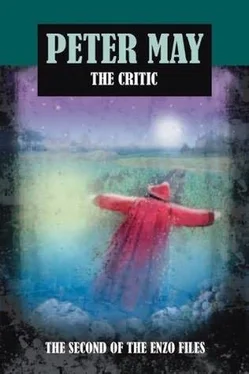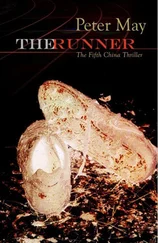Peter May - The Critic
Здесь есть возможность читать онлайн «Peter May - The Critic» весь текст электронной книги совершенно бесплатно (целиком полную версию без сокращений). В некоторых случаях можно слушать аудио, скачать через торрент в формате fb2 и присутствует краткое содержание. Жанр: Классический детектив, на английском языке. Описание произведения, (предисловие) а так же отзывы посетителей доступны на портале библиотеки ЛибКат.
- Название:The Critic
- Автор:
- Жанр:
- Год:неизвестен
- ISBN:нет данных
- Рейтинг книги:5 / 5. Голосов: 1
-
Избранное:Добавить в избранное
- Отзывы:
-
Ваша оценка:
- 100
- 1
- 2
- 3
- 4
- 5
The Critic: краткое содержание, описание и аннотация
Предлагаем к чтению аннотацию, описание, краткое содержание или предисловие (зависит от того, что написал сам автор книги «The Critic»). Если вы не нашли необходимую информацию о книге — напишите в комментариях, мы постараемся отыскать её.
The Critic — читать онлайн бесплатно полную книгу (весь текст) целиком
Ниже представлен текст книги, разбитый по страницам. Система сохранения места последней прочитанной страницы, позволяет с удобством читать онлайн бесплатно книгу «The Critic», без необходимости каждый раз заново искать на чём Вы остановились. Поставьте закладку, и сможете в любой момент перейти на страницу, на которой закончили чтение.
Интервал:
Закладка:
‘Petty’s daughter is here,’ Enzo said, as a way of distracting them. ‘She’s staying at Chateau de Salettes.’ It worked. The whiteboard was suddenly forgotten.
‘What has she come for?’ Pierric wanted to know.
‘Her father’s things.’
‘Some of his stuff was here for ages after he vanished,’ Paulette said. ‘The family never showed any interest at the time.’
‘Maybe she’ll want to come and talk to you.’
Neither of them seemed happy at the prospect. They were an odd couple. Parisians. He had been something big in insurance. Then twenty years ago they had given up everything to buy and restore what had been little more than a ruin when they bought it, living in the little cottage while the work was carried out on the chateau. Now they catered to wealthy tourists and made organic wine from fourteen hectares of vineyard they had planted themselves. They had given Enzo a bottle of their red and it wasn’t bad.
Now he bounded up the steps to the door as the joiner emerged carrying his bag of tools. ‘All done, Monsieur Macleod. I’ll send the bill to the chateau, shall I?’
‘No, I’ll settle in cash. How much do I owe you?’
The menuisier thought for a moment. ‘Two hundred.’
‘Euros?’
‘Well, it would hardly be francs now, would it?’
Reluctantly, Enzo counted out the notes. It was more than he had expected, and he only had a small, unofficial budget from the university.
When the joiner had gone, Enzo stood and surveyed his board, mounted squarely on the far wall. The Lefevres appeared at his back, anxious to see what damage had been done. But the menuisier had been tidy and left no mess, and whatever damage there was to the wall was hidden from view. Enzo strode across the room, took out a blue marker pen and wrote “Gil Petty” in the top left corner. In the middle of the board he wrote “Ordre de la Dive Bouteille,” circled it and drew an arrow to it from Petty’s name.
It was a start. But he needed help.
He fumbled in his trouser pockets for his cell phone and cursed softly when he saw that the battery indicator was flashing. He turned to Paulette and Pierric. ‘Is there any chance I could use a phone in your office?’
III
The old stone farmhouse on the hill above had been empty as long as Nicole could remember. As a child she had played inside it, until her father had hammered wooden boards across the door. It was dangerous, he had said.
She climbed the track towards it now, glad for a breath of air, past the wood her father had cut and stacked to dry. The collies ran about her legs, chasing each other, barking at the wind. Where the track turned into the old, abandoned farmyard, she stopped and looked out across the rolling, tree-covered hills of the Auvergne. Crystal clear streams cut deep through the rich, red soil so that it seemed the land was repeatedly folding over on itself. She loved the random nature of it; the way it changed through the seasons. The colour of the trees. A field ploughed one year, given over to pasture the next. She loved in equal measure the hot, summer wind that blew up from Africa and the icy winter blasts driven in from the Atlantic.
But most of all she loved her mother and her father, and her heart was filled with fear for them both.
She sat on an old tree-stump, and the collies frolicked around her, pushing against her legs as she tousled their heads in turn. She had spent most of the morning in her mother’s darkened room, just holding her hand for comfort, then made her father’s lunch when he brought the sheep down from the high grazing. Now she had a little time to herself. Time to think about the future. To fret about it. To fear for it. University would start again in just a few days, and she didn’t know how her father was going to manage without her.
Even worse, she had no idea how he would manage without his wife. It had been a long, depressing summer since the doctor had diagnosed terminal cancer. It could be weeks, he’d said. Months, if she was lucky. Lucky! Nicole didn’t think so.
The sound of the car came to her on the wind before she saw it, sunlight catching its roof as it wound its way up the track from the valley below, past the great pile of old tyres holding down the bache that covered the silage. She watched as it drew up in the yard below, and her aunt got out to greet her elder brother, Nicole’s father. They held each other for a long time before he took her case from the trunk and they went into the house. She would be there now until the end, and Nicole had pangs of guilt at the relief she felt. It was like being let out of prison. Or like a runner, exhausted and failing, passing on the baton for someone else to run the final leg.
The dogs crowded around her, peering up anxiously into her face, sensing her distress. She spoke to them softly, running her hands back over upturned heads, and felt a comfort in their untiring love.
‘Nicole!’
She looked up as she heard her name carried on the breeze. Her father stood on the stoop, the telephone held up in his hand. He was a big man, his ruddy complexion visible from here, beneath the ubiquitous cloth cap pushed back on his bull head.
‘A call for you!’
IV
Enzo watched as the tractor backed into the shed, maneuvering the blue Rock trailer up to the pressoir. It rose on pneumatic cross-levers until its funnel slipped into the mouth of the press, and the giant screw inside the trailer started turning, gently mashing the grapes into their constituent parts of juice, skin, seed, and stalk. Somehow, somewhere in the machine, the stalks got separated from the grapes and were spat out into large plastic bins, while the juice and skins and seeds were pumped under pressure through a plastic tube leading into the next shed. A man crouched beneath the pressoir, gently feeding clear liquid from a plastic bottle into the mix.
‘SO^2. Sulphur dioxide,’ Laurent de Bonneval shouted above the roar of the motors. ‘Kills the bad bacteria without damaging the yeasts, and protects the wine from oxidation.’ He was wearing a wine-stained tee-shirt, ragged shorts, and a pair of green Wellington boots.
He turned back to sheafs of paper he was examining on a table pushed up against the wall. A table littered with charts and weather forecasts and handwritten notes, test tubes and pipettes. A bin beside it was full of empty tins labelled Lafase He Grand Cru. Idly, Enzo picked one up to read that it had contained “purified pectolytic enzymes” for increasing the “selective extraction of compounds from grape skins”.
Bonneval grinned. ‘There’s a lot of science in winemaking, Monsieur Macleod. We balance sulphites against Ph. We measure sugar and acidity and alcohol. We use cold to inhibit fermentation, heat to accelerate it. But, really, it’s much more than that. It’s about instinct, and flair, and sophistry. A kind of alchemy. Magic, if you will.’ He turned towards the mixture being squeezed out of the pressoir. ‘Two winemakers can take the same grapes, from the same vintage, and produce entirely different wines. One might give you soft, vanilla fruit, the other tannic green pepper. It could even be argued that a wine reflects the personality of the winemaker.’
‘And what do you make, Monsieur de Bonneval? Soft vanilla fruit, or tannic green pepper?’
Bonneval smiled, brown eyes full of mischief and amusement. ‘Oh, soft vanilla fruit, of course. These days winemakers must pander to the tastes of critics who grew up drinking Coca Cola and root beer.’
‘Which says what about your personality?’
He threw his head back and laughed. ‘Probably just that I’m a man keen to sell his wines.’
Enzo followed him through to the adjoining shed where red flexitubes, like giant worms, lay about the floor, attached to motorised pumps, moving grape juice under pressure between tanks. Workers were dragging tubes from one black bucket full of foaming pink juice to another, then hauling them up ladders to grilled walkways overhead which provided access to the tops of two rows of huge stainless steel vats. The air was filled with the distinctive smell of mashed grapes and alcohol, thick and heady. And all the time the roar of the pressoir and the pulse of the pumps assaulted the ears.
Читать дальшеИнтервал:
Закладка:
Похожие книги на «The Critic»
Представляем Вашему вниманию похожие книги на «The Critic» списком для выбора. Мы отобрали схожую по названию и смыслу литературу в надежде предоставить читателям больше вариантов отыскать новые, интересные, ещё непрочитанные произведения.
Обсуждение, отзывы о книге «The Critic» и просто собственные мнения читателей. Оставьте ваши комментарии, напишите, что Вы думаете о произведении, его смысле или главных героях. Укажите что конкретно понравилось, а что нет, и почему Вы так считаете.












